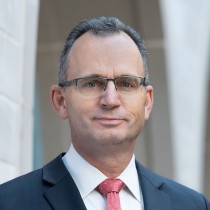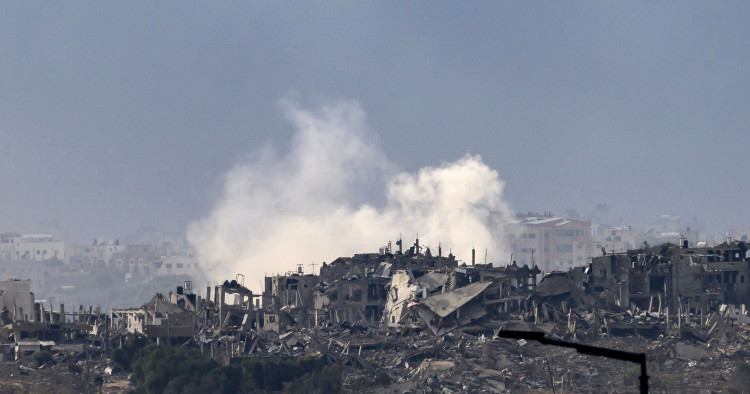Contents:
- Midway through the battle, still at square one in the political endgame
- Bahrain's condemnation of Hamas can help restore high-level Israel-Arab engagement, while COP28 presents an opportunity
- America and its Middle East partners fall short in addressing two strategic challenges in the current Middle East crisis
- Two legal cases show responsibility for Syrian atrocities rests with the highest levels of the regime
- Lots of sound and fury in Pakistan over the Gaza war
Midway through the battle, still at square one in the political endgame
Paul Salem
President and CEO

-
There is no credible pathway toward long-term security and stability for both Israelis and Palestinians except a two-state solution, and partnership with key Arab states in this potential endeavor makes this a historic opportunity that should not be missed.
-
The immediate priority remains to aid and protect innocent civilians, while the longer-term priority is to step up the political endgame through strong U.S. commitment, leadership, and diplomatic outreach to partners in the region.
Six weeks since the start of Israel’s military response to the Hamas attack of Oct. 7, which killed 1,200 Israelis, Hamas has been degraded, over 13,000 Palestinian civilians have been killed, and the Israeli war plan is now set to move into the southern Gaza Strip. Meanwhile, both the United States and Arab and Islamic countries have called to revive the two-state solution, yet Benjamin Netanyahu’s government has demurred, now raising the specter of a long-term Israeli occupation of Gaza in addition to the West Bank, and it has yet to curb settler violence in the latter Palestinian territory. The “no-state” solution has proven neither viable nor sustainable, however; whereas, a one-state solution is rejected by both sides. Put simply, there is no credible pathway toward long-term security and stability for both Israelis and Palestinians except a two-state solution. The fact that, today, the key Arab states are not antagonists but rather partners in this potential endeavor makes this a historic opportunity that should not be missed.
Israel’s military campaign, enormously costly to Palestinian civilian lives, homes, and livelihoods, has met less-than-expected resistance from Hamas. By the same token, although Israel reports that several hundred Hamas fighters have been killed, apparently few of its leaders have been eliminated. The threatened “second front” that Iran, through Hezbollah, might have opened from the north has not materialized and is looking less likely — indeed, there are reports that the Iranians, not having been informed about the scale of the Hamas operation, have told the Palestinian militant group that Tehran will not fully enter this fray. The Israeli ground operation, having largely demolished and subdued much of northern Gaza, is now poised to move to the southern portion of the strip. How this will unfold in the midst of over 2 million civilians is a bone-chilling scenario to contemplate.
Meanwhile, intensive negotiations to free civilian Israeli captives in exchange for Palestinian women and youths in Israel jails are proceeding and could be linked, if successful, to a temporary humanitarian pause. International and regional calls — though not from the U.S. — for a ceasefire have been rejected by Israel.
The immediate priority remains to aid and protect innocent civilians. The point of calling for a ceasefire is to cease firing on non-combatants, to prioritize their lives and wellbeing, while adapting any fight against Hamas to a more targeted campaign that will not harvest another 10,000 or 20,000 civilian lives, many of them children.
The longer-term priority is to step up the political endgame. President Joe Biden and his administration should build out his spoken commitment to reviving a two-state solution with a clear U.S. plan for the outlines of such a solution, strong diplomatic outreach to partners in the region and internationally, and a clear timetable that would aim to bring this about before the end of 2024. Only then could one begin to hope that the innocent lives on both sides might not have been lost completely in vain.
Follow on Twitter: @paul_salem
Bahrain's condemnation of Hamas can help restore high-level Israel-Arab engagement, while COP28 presents an opportunity
Nimrod Goren
Senior Fellow for Israeli Affairs

-
Israelis expect moderate Arab leaders to condemn Hamas for the terror attack of Oct. 7, and the Bahraini crown prince has set an example, which can lead to additional constructive steps.
-
COP28 presents an opportunity for restoring high-level Israeli-Arab engagement; thus, President Herzog should keep his plan to attend the conference, and the U.S. should preside over a regional meeting there.
The opening day (Nov. 18) of this year's International Institute for Strategic Studies (IISS) Manama Dialogue gave Israelis something they had yearned to hear from regional leaders since Oct. 7 — a clear and unequivocal condemnation of Hamas. In his keynote address, Bahraini Crown Prince Salman bin Hamad Al Khalifa called the Hamas attack barbaric, horrific and indiscriminate, and stated that the release of hostages is a prerequisite to a pause in hostilities.
The speech also expressed criticism of the intensity of Israel’s retaliation as well as fierce opposition to any forced displacement of Palestinians in Gaza, reoccupation of the Gaza Strip, and reduction to Gazan territory. While Israelis may not like or agree with such criticism and red lines, they are not surprised by them They were disappointed, however, by the lack of any additional condemnations of Hamas by other neighboring leaders as well as by the consequences some Arab scholars have faced for speaking up against what Hamas did.
Formal interactions between Israeli and regional representatives have reportedly been limited in recent weeks to discussions between intelligence officials, mostly dealing with efforts to release Israeli hostages: Mossad chief David Barnea visited Qatar, Israeli Security Agency head Ronen Bar met his Egyptian counterpart in Cairo, and Turkish President Recep Tayyip Erdoğan revealed that his intelligence executive has been talking with the Israeli side. Other discreet channels of dialogue are most likely also in place, emphasizing the gap between conflictual public rhetoric and covert advancements of national interests.
But, as international planning toward new post-war regional realities picks up pace — emphasizing the need for a two-state solution — the lack of Arab interaction with moderate Israeli officials can become a burden. Israel and Arab states share some regional interests, including when it comes to the future of Hamas, and can benefit from discussing these issues together. When such discussions are held in the public eye, rather than behind closed doors, they convey a public message that reality is less polarized and more complex than initially perceived — and that dialogue is legitimate even when deep policy differences are at play.
A relevant opportunity is looming. In a couple of weeks, the 2023 United Nations Climate Change Conference (28th Conference of the Parties, COP28) will convene in Dubai. Israeli President Herzog and Prime Minister Benjamin Netanyahu were both invited to take part, well before the war broke out, and had confirmed their participation. No announcement was made to date of their invitations being withdrawn. While Netanyahu is not in a position to go given the situation, Herzog should stick to his travel plans, and the United States could orchestrate a meeting between him and moderate regional leaders on the sidelines of the event.
Since coming into office in 2021, Herzog has already contributed to the restoration of trust with Jordan and Turkey as well as to advancing a positive agenda between Israel and Arab states. He is well respected in the region and was the only Israeli official who received calls from regional heads of state (the United Arab Emirates and Turkey) after Oct. 7. Charting a path from conflict to peacemaking requires engagement, and the U.S. can bring Herzog together with some regional counterparts on the sidelines of COP28. It could be a constructive step forward and is well worth a trip to Dubai by the Israeli president.
Follow on Twitter: @GorenNimrod
America and its Middle East partners fall short in addressing two strategic challenges in the current Middle East crisis
Brian Katulis
Vice President of Policy

-
The United States continues to engage in crisis diplomacy with hopes rising for a breakthrough in hostage diplomacy.
-
Two strategic challenges — the lack of a shared vision for the end state after the Gaza war and the role of Iran in the region — remain largely unaddressed.
“Simply calling for a ceasefire is not a path to peace,” Brett McGurk, the coordinator for the Middle East and North Africa at the National Security Council in the Biden administration, argued, speaking this past weekend in Bahrain at the Manama Dialogue 2023. His comments came at a contentious time for America’s relations with many of its partners in the Middle East, a number of whose officials traveled to China this week to rally support for a ceasefire in the Gaza war.
At the start of this week, it remains unclear whether ongoing negotiations to achieve a release of hostages held by Hamas along with a pause in fighting will prove successful. Even if these talks produce results, the United States and its Middle East partners face two major strategic challenges in the current Middle East crisis.
First, the U.S., Israel, and many of America’s close Arab partners lack a shared vision for what’s to come next, when the Gaza war is over, and the absence of a clearly defined end state will continue to hamper short-term actions. U.S. Secretary of State Antony Blinken has outlined a vision that includes the Palestinian Authority assuming control in Gaza, an idea that was rejected by Israeli Prime Minister Benjamin Netanyahu. Blinken also raised the possibility of a regional force to help maintain control in Gaza after the war, an idea, in turn, strongly rejected by many of America’s Arab partners, including Jordan’s foreign minister this weekend.
“There’s no returning to October 6th,” McGurk said this weekend, echoing President Joe Biden’s remarks. But the shared vision of what’s to come next is nowhere closer as Israel’s military prepares to expand its operations to southern Gaza, where Palestinians were told to flee.
The second strategic challenge comes from the fact that the United States and its Middle Eastern partners lack a shared consensus on is the issue of Iran. In the short term, Washington continues to face challenges in its efforts to deter Tehran and its network of partners as they pose threats and conduct attacks, leading to divisions within the Pentagon. Longer term, a coherent U.S. strategy on Iran remains missing in action, and there’s no consensus with America’s closest regional partners.
President Biden’s Washington Post opinion piece this weekend reiterated the themes in a primetime address he made to the nation about a month ago. But Biden’s article didn’t mention one key point raised in last month’s speech: Iran. In that address, Biden highlighted that “Iran is — is supporting Russia’s [war] in Ukraine, and it’s supporting Hamas and other terrorist groups in the region. And we’ll continue to hold them accountable, I might add.” The policy drift on Iran represents a major strategic weakness in U.S. policy.
At a time when the United States has stepped up its engagement in the Middle East, it’s important to remain focused on addressing these long-term strategic challenges. Failing to do so risks again being trapped in the reactive and tactical crisis management mode that has dominated U.S. policy in the region for far too long.
Follow on Twitter: @Katulis
Two legal cases show responsibility for Syrian atrocities rests with the highest levels of the regime
Emma Beals
Non-Resident Scholar

-
A French court issued arrest warrants for President Bashar al-Assad and several Syrian officials for their role in a deadly 2013 chemical weapons attack, while the International Court of Justice issued preliminary measures in relation to a case regarding the use of torture in Syrian prisons.
-
The continued push for legal accountability offers a counter to the growing international legitimization of Assad, and it provides a measure of hope that the crimes his regime has committed won’t be forgotten.
International accountability for crimes committed in Syria's ongoing conflict moved forward on multiple fronts last week. A French court issued arrest warrants for President Bashar al-Assad, the president’s brother Republican Guard commander Gen. Maher al-Assad, and two other Syrian officials for their role in a chemical weapons attack in the Damascus suburbs of Eastern Ghouta in August 2013 that killed more than 1,000 people. Meanwhile, the International Court of Justice (ICJ) issued preliminary measures in relation to the case brought by Canada and the Netherlands regarding the use of torture in Syria’s vast prison system. Both cases show that responsibility for atrocities rests with the highest levels of the regime.
With the International Criminal Court out of reach, a range of legal pathways and instruments are being pursued with regard to Syria. These include the use of universal and extraterritorial jurisdiction, wherein states try cases for crimes committed in Syria through their courts. The groundbreaking French case was launched by Mazen Darwish’s Syrian Center for Media and Freedom of Expression along with victims of the attacks, and it was supported by the Syrian Archive and the Open Society Justice Initiative alongside others. The case alleges that the use of chemical weapons amounts to war crimes and crimes against humanity; moreover, it marks the first time an arrest warrant has been issued in this way for a head of state.
Since Syria's return to the League of Arab States, Assad’s international travel schedule has expanded. He was even expected to attend the 2023 United Nations Climate Change Conference (28th Conference of the Parties, COP28) the United Arab Emirates next month, but the arrest warrant will complicate this due to the judicial cooperation agreement signed between France and the UAE in 2007, which includes extradition. The issuance of an INTERPOL red notice may further inhibit the Syrian strongman’s travel.
In 2022, the Netherlands and Canada opened a case against Syria at the ICJ for the Syrian regime’s widespread use of torture and other cruel, inhumane, or degrading treatment or punishments. The court’s provisional measures call for Syria to prevent the use of torture or the destruction of evidence while the case is ongoing. The measures disappointed Syrian survivor groups, which hoped for legal instruments that would aid efforts to ascertain the fate and whereabouts of more than 120,000 people missing in Assad’s prisons. However, the case does represent an attempt to address and respond to an ongoing crime.
The continued push for legal accountability offers a counter to the growing international legitimization of Assad, and it provides a measure of hope that the crimes his regime has committed won’t be forgotten.
Follow on Twitter: @ejbeals
Lots of sound and fury in Pakistan over the Gaza war
Marvin G. Weinbaum
Director, Afghanistan and Pakistan Studies

-
Pakistan, like other Islamic states, has over the course of the now six-week-long war shrunk from taking aggressive measures to back up pro-Palestinian words; consequently, it has seen a widening of the divide between regime policies and popular sentiments.
-
In the event of an expanded conflict that draws in the Gulf states, the Pakistani military would find it difficult to avoid significantly greater involvement.
Statements and rallies in support of the Palestinian cause have not let up — around the world or inside Pakistan itself. The language has grown stronger and the demands for action louder. The war has provided Pakistan an opportunity for diplomatic activism on the international stage, enabling the country to draw closer to its Arab co-religionists as well as to relate to wealthy Gulf states other than with a begging bowl. It also has offered a rare occasion for Pakistan to build a national consensus on an issue other than Kashmir and provided a distraction from the country’s dysfunctional politics. Yet for all the fiery rhetoric, Pakistan, like other Islamic states, has over the course of the now six-week-long war shrunk from taking aggressive measures to back up its words. Consequently, it has seen a widening of the divide between regime policies and popular sentiments.
Pakistan’s caretaker government has hardly been silent in its verbal support for the Palestinian cause. Prime Minister Anwaarul Haq Kakar has accused Israel of war crimes and criticized the West for “double standards in defending Israeli actions in Gaza.” He has endorsed the idea of trying Israel for war crimes at the International Court of Justice and backed Hamas’s suggestion of an international mechanism to halt Israeli settlements. The Foreign Office in Islamabad has issued a statement urging backers of Israel to stop the “occupation” and “ethnic cleansing” of Palestinians. Pakistan has also called for an immediate cessation of Israeli military operations in Gaza and unhindered humanitarian and relief assistance, warning of potential spillover effects from the war.
Government public diplomacy has, however, been overshadowed by spreading civil discontent over Gaza. The country’s religious parties have followed weekly Friday prayers with pro-Palestine processions and rallies calling for strong condemnation of Israel and the United States along with greater support for Hamas. Politicians from mainstream as well as far-right religious-political parties have appealed for bolder government actions, some arguing that Pakistan supply weapons if not troops to Hamas. Although the country lacks official contacts with the militant group, several key political leaders are said to have recently interacted in Qatar with Hamas leader Ismail Haniyah. The country’s media has added its voice to the growing clamor that more be done to champion the Palestinian cause. In line with the Urdu press, the country’s leading, usually staid English-language paper, Dawn, has editorially referred to Israel’s actions in Gaza as “butchery” and “bloodthirsty.”
Demands for direct aid for Hamas gained momentum following reports in the media that Pakistan’s government secretly supplied weapons to Ukraine. Despite the government’s denial, there have been widely expressed charges of hypocrisy in the belief that the government and military in their support of Ukraine have prioritized Western interests but neglected Gaza’s Muslims. Anxious to counter this impression, Pakistan’s Army chief Asim Munir in a Corps Commanders Conference is reported to have stated that “Palestinian people have unequivocal diplomatic, moral and political support of the Pakistani nation,” and in a meeting with the Palestinian Authority’s ambassador to have condemned Israel for its “unabated violence and indiscriminate killing” in Gaza.
So long as the Gaza-Israel conflict remains contained, Pakistan, like other Muslim countries, is likely to continue to exercise restraint, avoiding direct involvement. But in the event of an expanded conflict that draws in the Gulf states, the Pakistani military would find it difficult to avoid significantly greater involvement. Unlike the Yemen war, where Pakistan for domestic, economic, and security reasons disappointed its Saudi allies by declining to join a coalition, the public’s emotional attachment to the Palestine issue would likely impel direct engagement. To do otherwise would be to risk further widening the gulf between Pakistan’s public and its policymakers.
Research assistant Naad-e-Ali Sulehria contributed to this piece.
Follow on Twitter: @mgweinbaum
Photo by JOHN MACDOUGALL/AFP via Getty Images
The Middle East Institute (MEI) is an independent, non-partisan, non-for-profit, educational organization. It does not engage in advocacy and its scholars’ opinions are their own. MEI welcomes financial donations, but retains sole editorial control over its work and its publications reflect only the authors’ views. For a listing of MEI donors, please click here.













